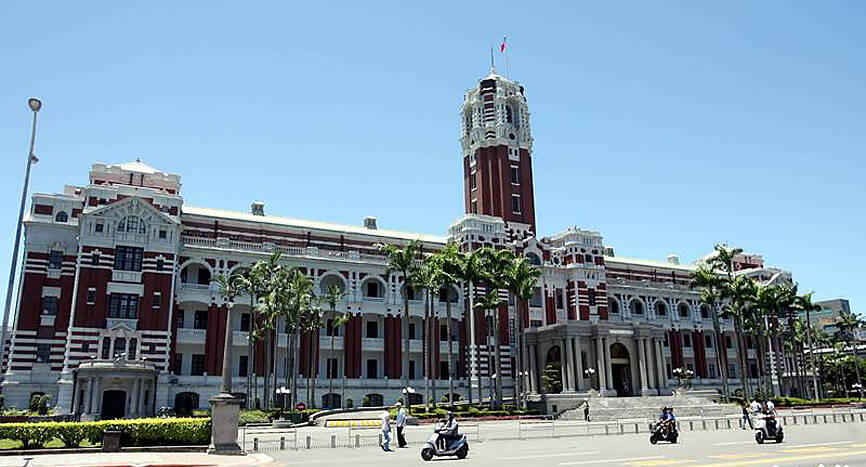Four former military personnel, including three who were responsible for security at the Presidential Office Building, were yesterday sentenced to imprisonment of up to seven years on charges of selling state secrets to China.
Three of the men, sergeant Lai Chung-yu (賴重宇), sergeant Lee Yu-hsi (黎育璽) and corporal Lin Yu-kai (林裕凱) served in the 211th Military Police Battalion,which guards the Presidential Office Building, while a fourth, Chen Wen-hao (陳文豪), served in the Ministry of National Defense’s Information, Communications and Electronic Force Command.
The Taipei District Court sentenced Lai to seven years, Lee to six years and eight months, and Chen to six years and five months in prison, with all of them deprived of their civil rights for six years.

Photo: Wang Ting-chuan, Taipei Times
Lin was sentenced to five years and 10 months and deprived of his civil rights for five years.
The court also confiscated NT$664,100 from Lee, NT$460,000 from Lai, NT$450,000 from Chen and NT$265,900 from Lin.
Lai, Lee and Chen were already discharged from the military when prosecutors launched their investigation, and Lin was suspended in August last year when he was detained.
From the end of 2021 to the beginning of 2022, Lai and Chen were allegedly brought into the scheme by a man surnamed Huang (黃), Taipei prosecutors said.
Starting in April 2022, Chen used his cellphone to take photographs of classified documents before passing them on to Lai and Chen, or Chinese agents, they said.
From March 2023 to August last year, Chen, operating under an alias, started to seek out fellow soldiers who would be willing to spy on behalf of China for rewards, prosecutors said.
He forwarded the information of one active-duty soldier to Lai, although the soldier did not agree to join the scheme, they said.
Lai and Chen were compensated by the level of sensitivity of information provided to the agents, and how many fellow soldiers they contacted as part of the scheme, they said.
In October 2022, Lai was transferred to a new unit, and he referred Lee to his old unit, who continued the scheme by using his cellphone to take photographs of official documents and pass them on to agents, they said.
After Lee was discharged from the military, he introduced Lin to the unit, who continued the espionage activities from January last year onward, they said.
The Taipei District Prosecutors’ Office concluded its investigation in December last year, charging the four with accepting bribes in contravention of the Anti-Corruption Act (貪污治罪條例) and the National Security Act (國家安全法) in exchange for collecting state secrets on behalf of China.
Prosecutors said all four men confessed after being questioned and detained.

The manufacture of the remaining 28 M1A2T Abrams tanks Taiwan purchased from the US has recently been completed, and they are expected to be delivered within the next one to two months, a source said yesterday. The Ministry of National Defense is arranging cargo ships to transport the tanks to Taiwan as soon as possible, said the source, who is familiar with the matter. The estimated arrival time ranges from late this month to early next month, the source said. The 28 Abrams tanks make up the third and final batch of a total of 108 tanks, valued at about NT$40.5 billion

Two Taiwanese prosecutors were questioned by Chinese security personnel at their hotel during a trip to China’s Henan Province this month, the Mainland Affairs Council (MAC) said yesterday. The officers had personal information on the prosecutors, including “when they were assigned to their posts, their work locations and job titles,” MAC Deputy Minister and spokesman Liang Wen-chieh (梁文傑) said. On top of asking about their agencies and positions, the officers also questioned the prosecutors about the Cross-Strait Joint Crime-Fighting and Judicial Mutual Assistance Agreement, a pact that serves as the framework for Taiwan-China cooperation on combating crime and providing judicial assistance, Liang

A group from the Taiwanese Designers in Australia association yesterday represented Taiwan at the Midsumma Pride March in Melbourne. The march, held in the St. Kilda suburb, is the city’s largest LGBTQIA+ parade and the flagship event of the annual Midsumma Festival. It attracted more than 45,000 spectators who supported the 400 groups and 10,000 marchers that participated this year, the association said. Taiwanese Designers said they organized a team to march for Taiwan this year, joining politicians, government agencies, professionals and community organizations in showing support for LGBTQIA+ people and diverse communities. As the first country in Asia to legalize same-sex

MOTIVES QUESTIONED The PLA considers Xi’s policies toward Taiwan to be driven by personal considerations rather than military assessment, the Epoch Times reports Chinese President Xi Jinping’s (習近平) latest purge of the Chinese People’s Liberation Army (PLA) leadership might have been prompted by the military’s opposition to plans of invading Taiwan, the Epoch Times said. The Chinese military opposes waging war against Taiwan by a large consensus, putting it at odds with Xi’s vision, the Falun Gong-affiliated daily said in a report on Thursday, citing anonymous sources with insight into the PLA’s inner workings. The opposition is not the opinion of a few generals, but a widely shared view among the PLA cadre, the Epoch Times cited them as saying. “Chinese forces know full well that